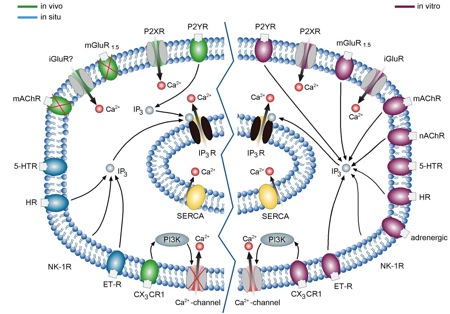Microglial calcium signaling in the adult, aged and diseased brain

Microglial cells are the resident immune cells of the CNS. They mediate innate immune response of the brain to injury, inflammation and neurodegenerative diseases. Apart from their role in disease they are critically involved in the development and plasticity-driven reorganization of neuronal networks and the homeostatic maintenance of brain tissue.
Accumulating in vitro evidence suggests that executive functions of microglia are coupled to the intracellular Ca2+ signaling of these cells. So far, however, very little is known about microglial Ca2+ signaling in situ or in vivo, both in the healthy and in the diseased brain. Here, we summarize the recent in vivo/in situ findings and compare the properties of surveillant microglia in these preparations with those of microglia in vitro. The data suggest that surveillant microglia rarely show spontaneous Ca2+ transients, express fewer functional receptors directly coupled to changes in the intracellular free Ca2+ concentration on their surface, but vividly respond with Ca2+ transients to cell or tissue damage in their microenvironment. Interestingly, some of these properties microglia share with monocytes engrafting in the brain under pathological conditions.
See more: http://dx.doi.org/10.1016/j.ceca.2012.12.003
- 62 views
